Nicotine Replacement Therapy Market Research, 2031
The global nicotine replacement therapy market was valued at $2.7 billion in 2021 and is projected to reach $5.9 billion by 2031, growing at a CAGR of 8.3% from 2022 to 2031. Nicotine replacement therapy is a medically approved way to treat people with tobacco use disorder by taking nicotine by means other than tobacco. It is used to help with quitting smoking or stopping tobacco chewing. It increases the chances of quitting tobacco smoking.
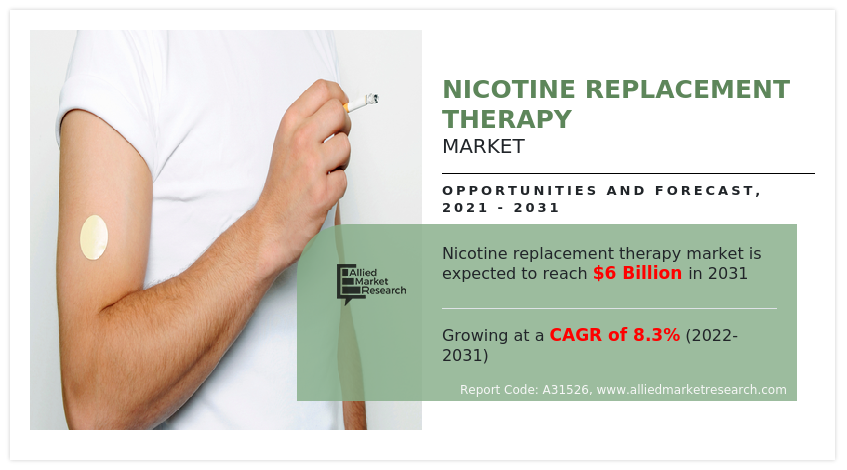
The increase in the number of tobacco-addicted people and the number of people willing to stop tobacco consumption contributes to the growth of the Nicotine Replacement Therapy Market Size. As a result of the rise in tobacco-driven diseases, people are influenced to quit tobacco chewing and tobacco smoking.
Furthermore, an increase in demand for nicotine replacement products and advancements in nicotine replacement therapy treatment drive the growth of the Nicotine Replacement Therapy Market Size. In addition, the increase in the prevalence of tobacco-associated diseases drives the growth of the market. For instance, according to the report by the American Cancer Society (ACS) published in October 2020, tobacco use remains the leading preventable cause of death in the U.S., accounting for about 1 in 5 deaths each year.
Moreover, the rise in demand for advanced nicotine replacement therapy treatment, the latest product launches, product approvals, and the presence of key players contribute to the growth of the market. In addition, the increase in the prevalence of cancer and respiratory disorders owing to tobacco consumption and smoking provides a boost to the market. For instance, in September 2020, according to World Health Organization (WHO), every year, 1.9 million people die from tobacco-induced heart disease worldwide. Tobacco smoking increases the formation of plaque in blood vessels. Moreover, it can cause an increase in blood pressure, heart rate, and flow of blood to the heart as well as a narrowing of the arteries. Thus, owing to such harmful effects of smoking on health, various governments have made strict regulations such as a ban on nicotine products such as gutka and paan masala, and heavy taxation on tobacco products such as cigarettes, cigars, and bidis. In addition, various government and non-government organizations work to promote the awareness about ill effects of tobacco on the body, which in turn, contributes to the Nicotine Replacement Therapy Market Growth.
Furthermore, factors that drive the growth of the nicotine replacement therapy market include an increase in healthcare expenditure, a rise in the number of key players who manufacture nicotine replacement products at affordable cost, and collaboration between manufacturers and organizations to supply nicotine cessation aids. In addition, the growing number of people who are willing to discontinue smoking contributes to the growth of the Nicotine Replacement Therapy Industry.
Growth in the number of hospitals, surge in access to healthcare facilities globally, and increased healthcare expenditure drive the growth of the market. For instance, according to the American Medical Association (AMA), health spending in the U.S. increased by 9.7% in 2020 to $4.1 trillion or $12,530 per capita. There is a rise in government initiatives to provide improved healthcare facilities. In addition, growth in the private hospital sector, medical tourism, and ambulatory surgical clinics augment the growth of the Nicotine Replacement Therapy Industry.
The nicotine replacement therapy market is segmented on the basis of product, sales channel, location, and region. As per product segment, the market is fragmented into gums, lozenges, patches, and others. Depending on the sales channel segment, it is segregated into online and offline. According to location, it is categorized into hospitals & deaddiction centers, and homes. Region-wise, the market is analyzed across North America (U.S., Canada, and Mexico), Europe (Germany, France, the UK, Italy, Spain, and the rest of Europe), Asia-Pacific (Japan, China, Australia, India, South Korea, and rest of Asia-Pacific), and LAMEA (Brazil, Saudi Arabia, South Africa, and LAMEA).
The nicotine replacement therapy market is segmented into Product, Sales Channel and Location.
On the basis of product, the market is classified into gums, lozenges, patches, and others. The gums segment dominated the Nicotine Replacement Therapy Market Share in 2021, and this trend is expected to continue during the Nicotine Replacement Therapy Market Forecast period, owing to the advantages of nicotine gum such as it provides an alternative chewing activity for chewing tobacco.
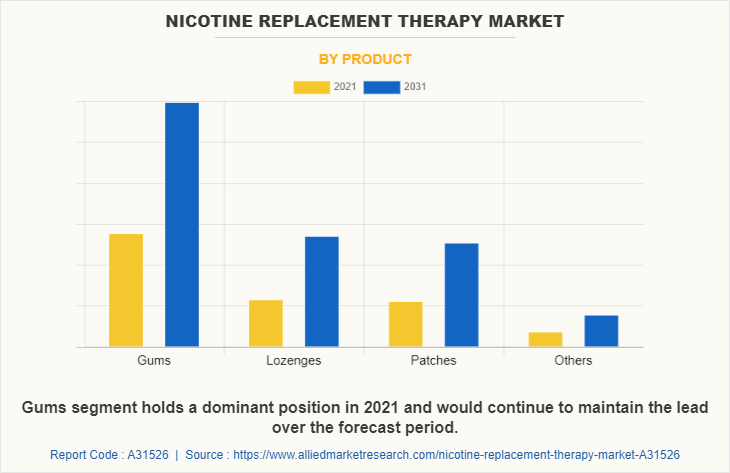
By sales channel, the market is divided into online and offline. The offline segment dominated the Nicotine Replacement Therapy Market Share in 2021, and this trend is expected to continue during the Nicotine Replacement Therapy Market Forecast period, owing to an increase in the availability of nicotine lozenges and gums at stores and pharmacies.
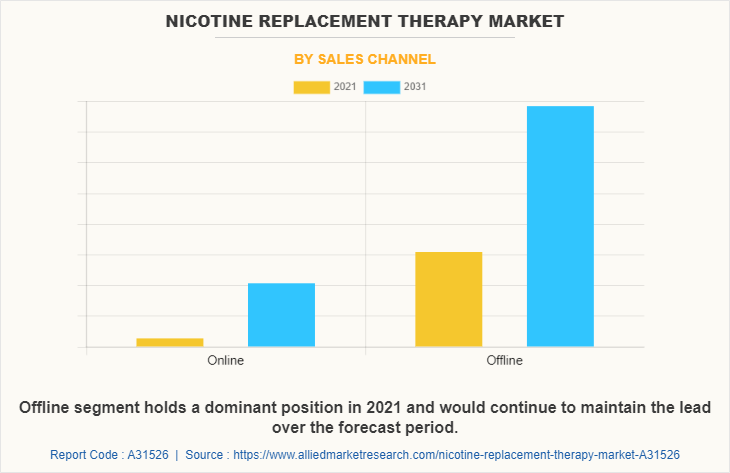
By location, the market is classified into hospitals & deaddiction centers, and homes. The hospitals & deaddiction centers segment dominated the market in 2021, and this trend is expected to continue during the forecast period, owing to an increase in the number of hospitals & deaddiction centers and a rise in the prevalence of tobacco-associated diseases.
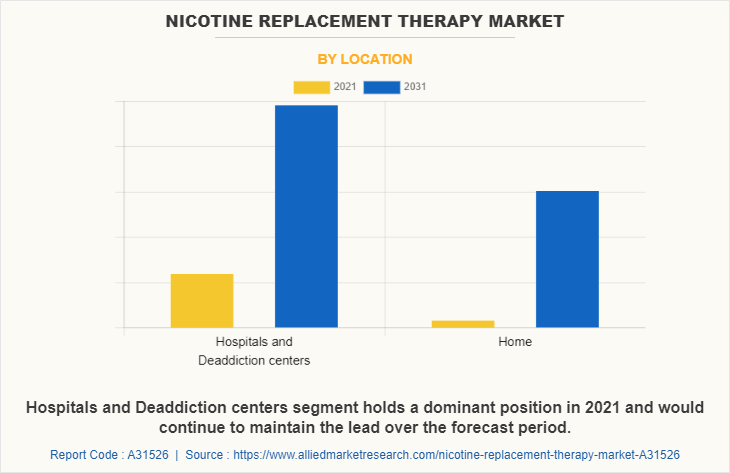
Region-wise, North America garnered the major share in the nicotine replacement therapy market in 2021 and is expected to dominate the global market during the forecast period, owing to the rise in the incidence of tobacco-associated diseases, well-developed healthcare infrastructure, and the presence of key players. However, Asia-Pacific is expected to register significant growth, owing to a surge in the prevalence of tobacco-driven diseases, improvement in the healthcare infrastructure, and the presence of a high population base.
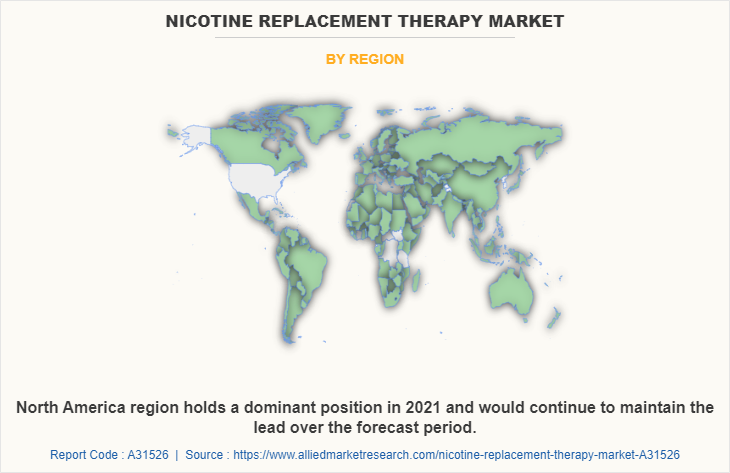
The major companies profiled in the report include Cipla Limited, Fertin Pharma Ltd., GlaxoSmithKline plc, Johnson & Johnson Inc., Lucy Goods, Inc., Pfizer Inc., PL Developments, Rubicon Research Pvt. Ltd., Sparsha Pharma International Pvt. Ltd., and Zydus Cadila.
Key Benefits For Stakeholders
- This report provides a quantitative analysis of the market segments, current trends, estimations, and dynamics of the nicotine replacement therapy market analysis from 2021 to 2031 to identify the prevailing Nicotine Replacement Therapy Market Opportunity.
- The market research is offered along with information related to key drivers, restraints, and opportunities.
- Porter's five forces analysis highlights the potency of buyers and suppliers to enable stakeholders make profit-oriented business decisions and strengthen their supplier-buyer network.
- In-depth analysis of the nicotine replacement therapy market segmentation assists to determine the prevailing market opportunities.
- Major countries in each region are mapped according to their revenue contribution to the global market.
- Market player positioning facilitates benchmarking and provides a clear understanding of the present position of the market players.
- The report includes the analysis of the regional as well as global nicotine replacement therapy market trends, key players, market segments, application areas, and market growth strategies.
Nicotine Replacement Therapy Market Report Highlights
| Aspects | Details |
| Market Size By 2031 | USD 6 billion |
| Growth Rate | CAGR of 8.3% |
| Forecast period | 2021 - 2031 |
| Report Pages | 290 |
| By Product |
|
| By Sales Channel |
|
| By Location |
|
| By Region |
|
| Key Market Players | GlaxoSmithKline plc, Pfizer Inc, Zydus Cadila, Sparsha Pharma International Pvt. Ltd., Rubicon Research Pvt Ltd, PL Developments, Fertin Pharma Limited, Johnson & Johnson Inc , Lucy Goods Inc, Cipla Ltd |
Analyst Review
This section provides the opinions of the top-level CXOs in the nicotine replacement therapy market. According to the CXOs, nicotine replacement therapy is a method and supportive therapy for the successful discontinuation of tobacco smoking and chewing. Both urban and rural areas have an addiction of tobacco consumption in various forms such as raw tobacco, cigarettes, bidis, hookah, and gutkha. Tobacco contains various constituents which are responsible for cancer. The sudden discontinuation of tobacco consumption may lead to withdrawal symptoms. Thus, nicotine replacement products such as gums and patches help people to quit tobacco by reducing nicotine cravings.
The factors such as the increase in the prevalence of tobacco-driven diseases such as cancer and heart diseases, advancements in nicotine replacement therapy, and a surge in awareness about ill effects of tobacco on health in the population drive the growth of the nicotine replacement therapy market.
North America is expected to witness the highest growth, in terms of revenue, owing to the rise in incidences of tobacco-driven diseases, and the presence of key players in the manufacturing & development of advanced nicotine replacement therapy. However, the strict government regulations and product bans in some countries can hamper the market growth.
The total market value of the nicotine replacement therapy market is $2659 million in 2021.
The forecast period in the report is from 2022 to 2031.
North America is the largest regional market for Nicotine Replacement Therapy.
The market value of the nicotine replacement therapy market in 2022 was $2906.29 million.
The top companies that hold the market share in nicotine replacement therapy market are Cipla Limited, Fertin Pharma Ltd., GlaxoSmithKline plc, Johnson & Johnson Inc., Lucy Goods, Inc., Pfizer Inc., PL Developments, Rubicon Research Pvt. Ltd., Sparsha Pharma International Pvt. Ltd., and Zydus Cadila.
The base year for the report is 2021.
Yes, nicotine replacement therapy companies are profiled in the report
Asia-Pacific is expected to register the highest CAGR of 10.1% from 2022 to 2031, owing to an increase in the number of people willing to quit tobacco, the presence of key players, and a high population.
Loading Table Of Content...


